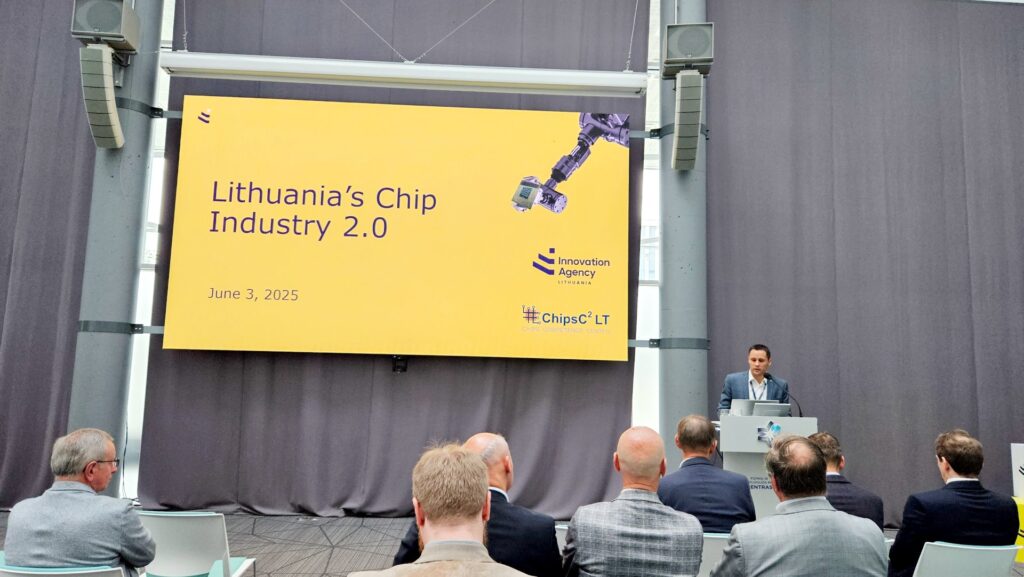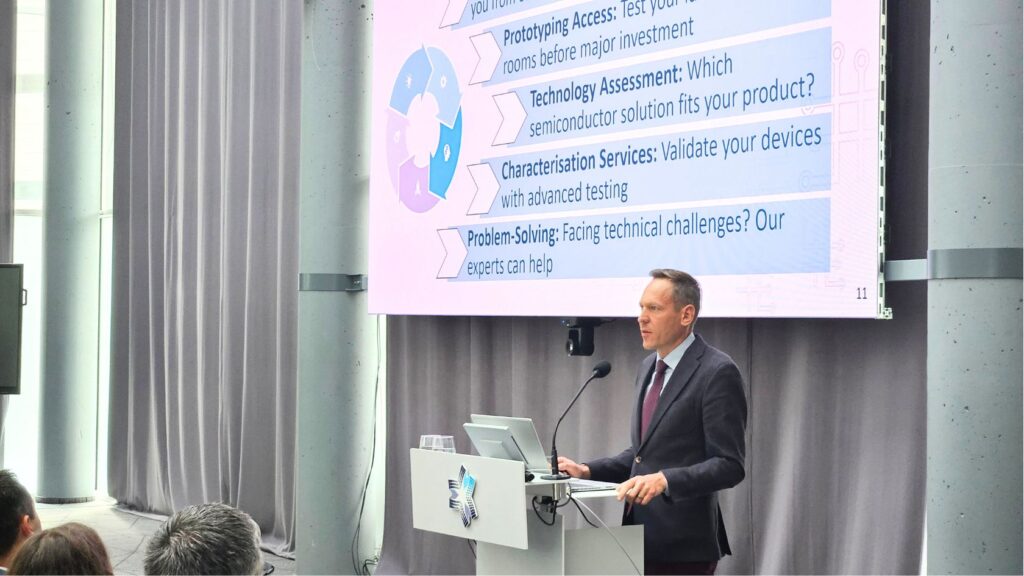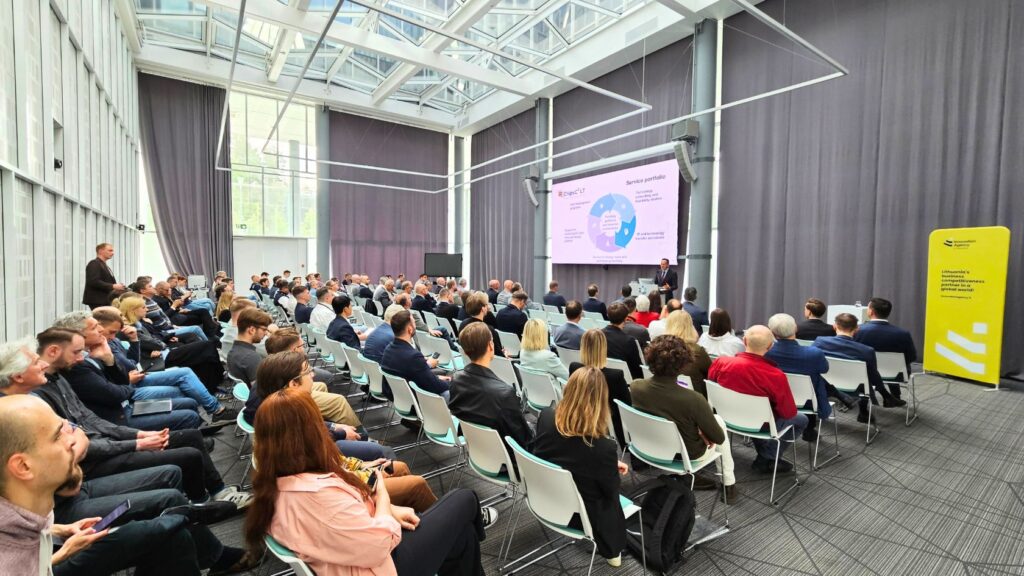June 3 The Innovation Agency together with FTMC organized a conference “Lithuanian Chip Industry 2.0”, where the newly opened National Chip Centre of Excellence “ChipsC² LT” was presented.
This is an exceptional, first-of-its-kind project in Lithuania where four of the country’s strongest scientific institutes and universities come together for a common cause – to promote the growth of the semiconductor industry: FTMC, Vilnius University, VILNIUS TECH and Kaunas University of Technology.
The Centre of Excellence will act as a virtual platform that will help Lithuanian companies develop semiconductor technologies. Business and industry will be able to apply with specific needs – and each of the four ChipsC² LT partners will provide services according to their competence. This process will be co-coordinated by the FTMC. With the help of European pilot lines, modern infrastructure and local expertise, companies will be offered personalised services, from chip design to testing.
Companies in the laser and photonics sector will also actively contribute to the development of this project.

Prof. Dr. Ramūnas Skaudžius, Director of FTMC, who welcomed the participants of the conference, said that today’s presentation of ChipsC² LT is like a kind of independence day – because it marks a promising new beginning for Lithuanian science and business. It was reminded that the origins of FTMC itself began with the development of semiconductors.
Dr. Gediminas Račiukaitis, Coordinator of ChipsC² LT, Head of the FTMC Laser Technology Division, presented the essential highlights about the Center of Competences. Its mission is to connect science and business, with a special focus on small and medium-sized enterprises. The project will last four years (2025-2029) and has been allocated 4 million euros. Half of the amount is allocated by the EU initiative to strengthen the European semiconductor industry and technological independence, Chips JU, and the other half by the Lithuanian Ministry of Education, Sports and Science.
G. Račiukaitis emphasizes the four most important strategic goals of the project. This means greater technological autonomy in critical sectors; reduced dependence on external supply chains; a stronger position in the European technology context and contributing to national defence and security capabilities.
Dr. Saulius Tumėnas, Head of the Semiconductor Optics Laboratory of the Optoelectronics Department of FTMC, told more specifically what services will be provided to businesses by FTMC, VU, VILNIUS TECH and KTU specialists. For example, they will advise companies from the creation of the idea to the production of the chip, test new technologies in their laboratories, help assess the suitability of semiconductors for the products they are developing, and help in case of technical obstacles.

According to S. Tumėnas, during the four years of the project, ChipsC² LT will also carry out skills development programs – more than 50 professional trainings, creative workshops and seminars will be organized for company employees. This training will be very practical and relevant to the specific needs of the business.
Dr. Gediminas Račiukaitis, coordinator of ChipsC² LT, talks in more detail about the upcoming start of the project.
Can it be said that the ChipsC² LT project is already officially launched today?
Partially. Officially, everything will start when we sign an agreement with our partners, but it will name the start of the project on June 2. Only formalities remain until the “real” start. All discussions and legal issues have already been resolved, and as we know, the European Commission has given the highest rating to the ChipsC² LT project we have submitted.
Of course, there will be difficulties at the beginning so that all partners start working towards a common cause, and not just in their narrower areas. Another thing is how to reach Lithuanian companies so that they are interested in the Chips Centre of Excellence. Here, it is very important to build a scientific and business community to trust us. Therefore, we invite specialists who already know us and have a wide circle of acquaintances to contribute to this project. If we create a strong community and have a good idea, everything will work.

A number of speakers at the conference said that both Lithuania and Europe in general need to strengthen the semiconductor sector – and act collectively, not individually.
The need is really high. We need original chips for various applications – the most striking example of this would be drones and similar technologies, where we abandon Chinese electronics and have to create our own, look for solutions that would bring added value.
For us (FTMC, VU, VILNIUS TECH and KTU), as scientific institutes, it is important to “sell” our knowledge and develop it as much as possible, to adapt to the needs of the industry, to understand which way to turn. It is very important to coordinate.
Another serious issue is competences. We can prepare many programs, but will we have enough people to implement them? On the other hand, we have seen many times (for example, in the field of physical sciences) when students flock when a new idea emerges. One of these was the construction of a new nuclear power plant in the country, and new study programmes have even appeared for this purpose. The power plant project failed, but those good students stayed in physics – and, after graduating, went to work elsewhere. There are super lasers from that generation.
It’s the same with the Chips Centre of Excellence – if we have a good idea, more people will choose the semiconductor field. I did this myself when I was a student, because at that time the topic of semiconductors was widely heard in Lithuania. And laser science has only just taken its first steps…
What do you need now, at the very beginning of ChipsC² LT, for businesses to start taking an interest in your services?
Today’s conference is dedicated to this. Some of Lithuania’s semiconductor companies are currently participating in another big event in Switzerland, but we are glad that business representatives have come to visit us as well. And this is just the beginning – we will coordinate at the right times, launch pilot lines so that business comes to us and our partners and sees what we are capable of. We will also use chip competence centers from other countries that are relevant to us to help.
When we launch the project, the system will definitely work – and then it will be possible to adjust it as needed. Everything is already on track.
Prepared by Simonas Bendžius

